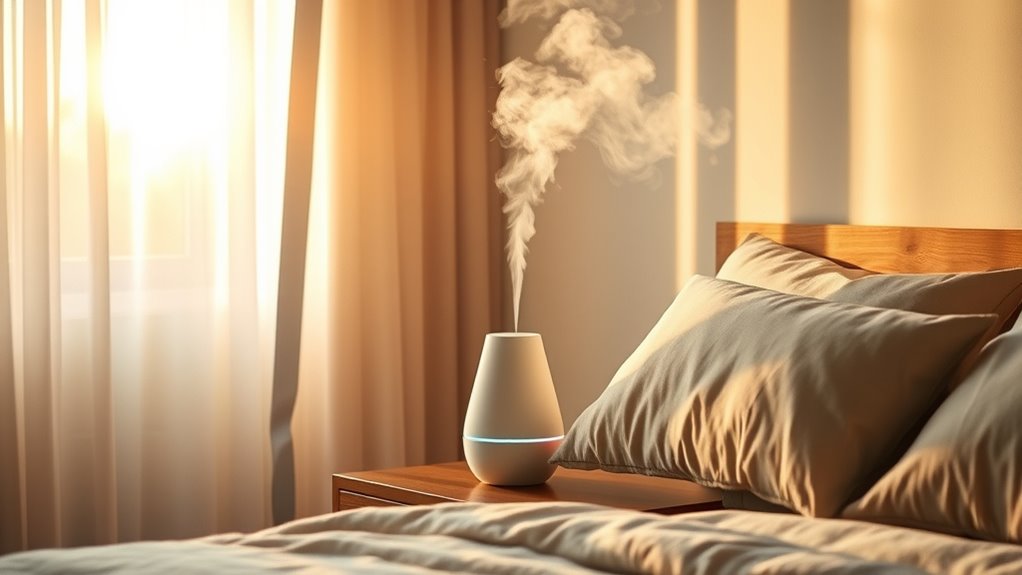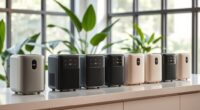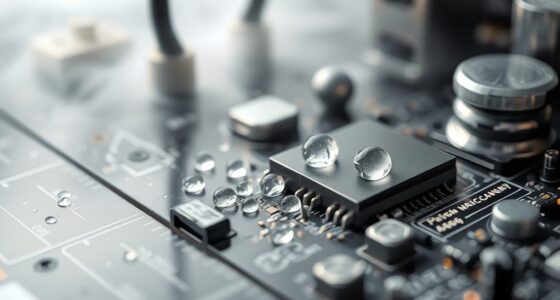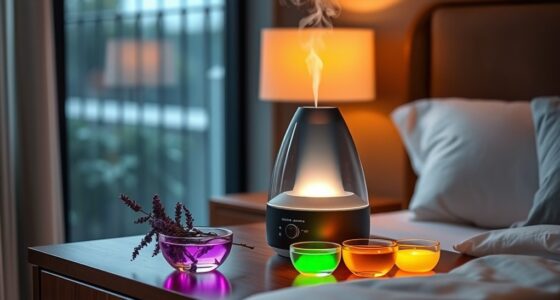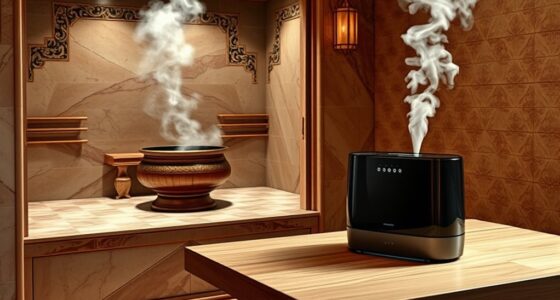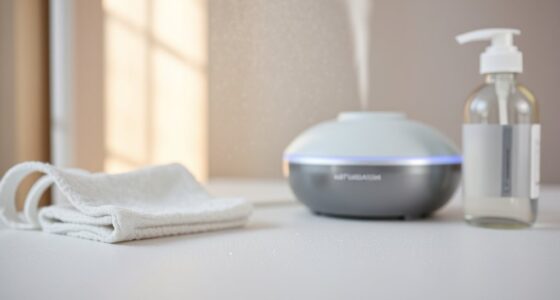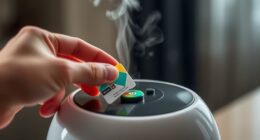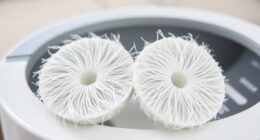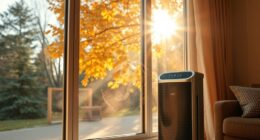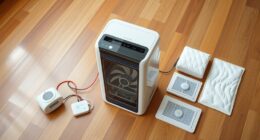For ideal comfort and efficiency, run your humidifier in the early morning when indoor air feels driest or before bed to improve sleep quality. During winter, operate it during the coldest parts of the day to counteract dry heat, while in warmer months, cut back to prevent excess humidity. Adjusting your humidifier based on daily routines and seasonal changes helps maintain a healthy indoor environment. Keep going to discover more tips for perfect timing.
Key Takeaways
- Run your humidifier early morning to combat dryness after waking up.
- Use it in the late evening before bed to enhance nighttime comfort.
- Adjust operation seasonally, using more in winter and less or none in summer.
- Target peak dryness times during the day for efficient moisture control.
- Avoid running during high humidity periods to conserve energy and prevent mold.
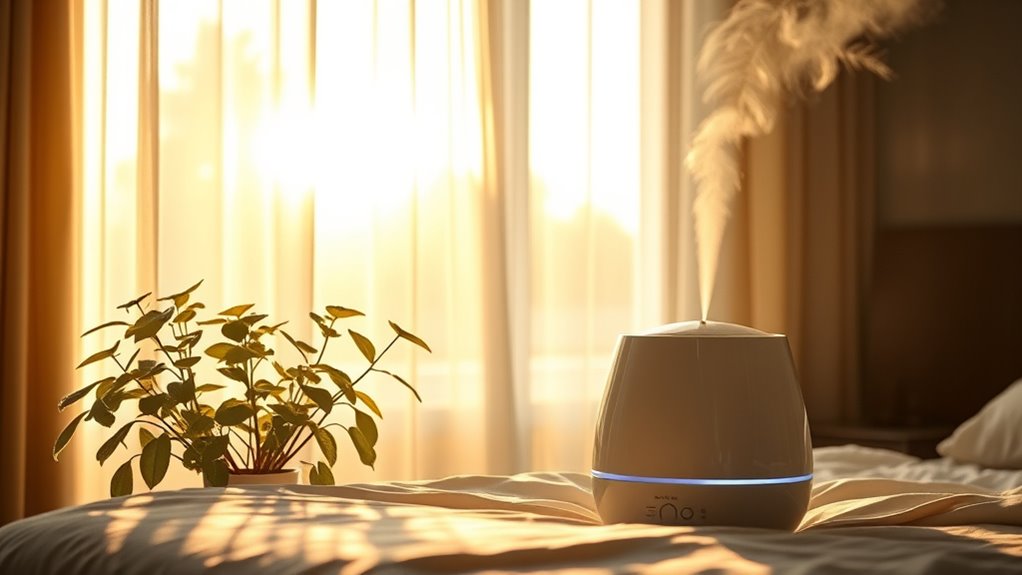
Using your humidifier at the right times can considerably improve your indoor air quality and comfort. When you understand the best times of day to run it, you can make smarter decisions that optimize its benefits while also saving energy. Seasonal adjustments play a big role here, as humidity needs fluctuate throughout the year. During winter, when indoor air tends to be drier due to heating, running your humidifier in the early morning or evening can help maintain a comfortable level of moisture. Conversely, in the summer or humid months, you may want to reduce or pause operation to prevent excess humidity, which can lead to mold growth and other issues.
Timing your humidifier use during specific parts of the day also enhances energy efficiency. Running it during peak times when indoor air quality feels most compromised—like early mornings or late evenings—means you’re targeting the periods when moisture levels are most likely to dip. This prevents unnecessary operation during times of naturally higher humidity, saving you electricity and prolonging the device’s lifespan. If you notice that your home tends to feel drier after waking up or when you wind down at night, those are prime opportunities to turn it on. Using your humidifier just during these periods ensures you’re providing relief exactly when needed, without wasting power during the day when the air might be relatively moist. Additionally, understanding the impact of humidity levels on comfort helps you to better time your humidifier usage.
Furthermore, aligning humidifier operation with your daily routine can help maintain consistent comfort. For example, you might set it to run for a short period in the morning before you’re fully active, and again in the late evening before bed. This way, you’re supporting your body’s natural rhythm and avoiding over-humidification that can be uncomfortable or unhealthy. Being mindful of seasonal adjustments allows you to fine-tune your usage, ensuring that the device works efficiently without over-consuming energy. In colder months, running your humidifier during the coldest parts of the day can prevent your home from feeling excessively dry, while reducing or turning off the device during warmer, more humid times can keep the indoor environment balanced.
Frequently Asked Questions
Can Running a Humidifier at Night Cause Mold Growth?
Running a humidifier at night can raise concerns about mold growth if you don’t practice mold prevention. Excess moisture can increase humidity levels, which may affect air quality and promote mold if your room isn’t well-ventilated. To avoid this, monitor humidity levels, keep the area dry, and clean your humidifier regularly. Proper use guarantees you improve air quality without risking mold, especially during nighttime when humidity tends to rise.
Is It Better to Run a Humidifier During the Day or Night?
Imagine your home as a living, breathing garden needing just the right moisture. You should run your humidifier during the day when air quality dips due to indoor activities, helping your space breathe easier. It also conserves energy by avoiding unnecessary use at night. This balance keeps your environment comfortable, healthy, and energy-efficient, ensuring your home remains a lush oasis rather than a damp, mold-prone swamp.
How Does Outdoor Humidity Affect the Best Time to Run a Humidifier?
Outdoor humidity influences when you should run your humidifier because it affects indoor air quality and energy efficiency. If outdoor humidity is high, you might not need to run it as often, saving energy and maintaining better air quality. Conversely, during dry, low-humidity days, running it during the day or night can improve comfort and air quality without wasting energy. Adjust your usage based on outdoor conditions for ideal results.
Should I Turn off My Humidifier When I Leave the House?
Leaving your humidifier on is like leaving a light on—it uses energy even when you’re not home. For better energy efficiency, it’s smart to turn it off when you leave, saving power and reducing noise. Plus, a silent, empty house won’t miss the humidifier running unnecessarily. You’ll keep the air balanced without wasting energy or creating unwanted noise, making your home more comfortable and efficient.
Can Running a Humidifier Too Long Damage My Furniture?
Running a humidifier too long can harm your furniture if you neglect furniture safety and proper humidifier maintenance. Excess humidity causes wood to swell, warp, or develop mold, damaging your belongings. To prevent this, monitor humidity levels and clean your humidifier regularly. By maintaining a safe humidity range and practicing good humidifier maintenance, you protect your furniture and ensure a healthy, comfortable environment.
Conclusion
So, now that you know the best times to run your humidifier, don’t forget to schedule it around your busy social life—or, you know, your Netflix binge sessions. Because nothing says “refreshing comfort” like waking up to a damp bedroom during your midnight snack run. Just remember, a well-timed humidifier is the secret weapon against dry skin and static—who knew your home could be so high-maintenance? Happy humidifying!
